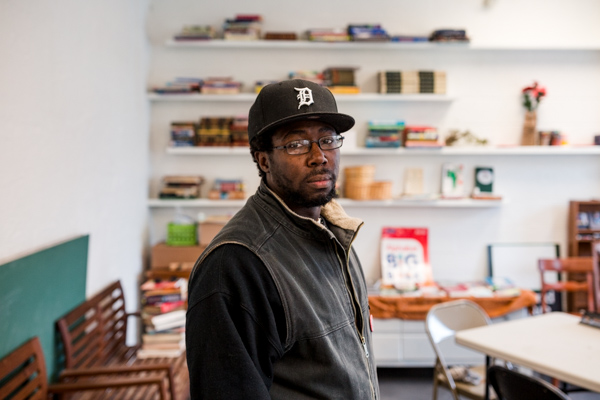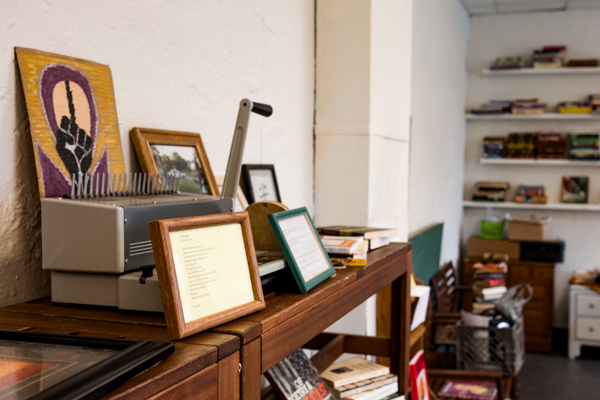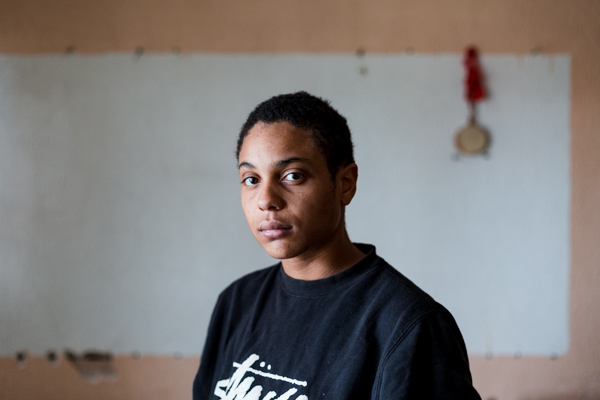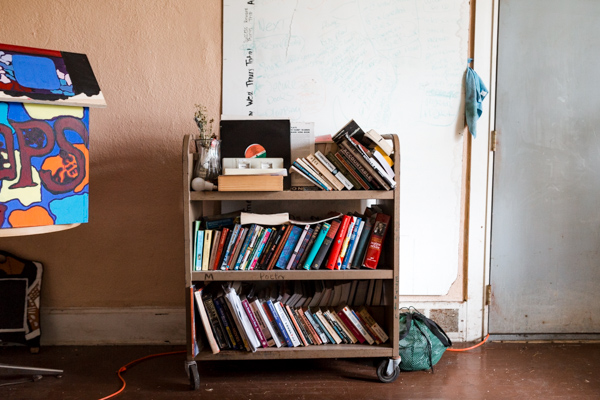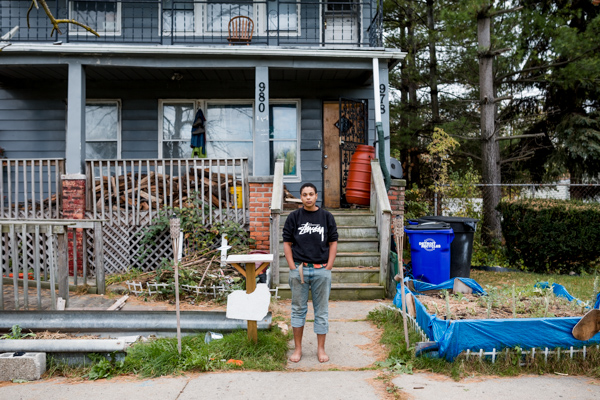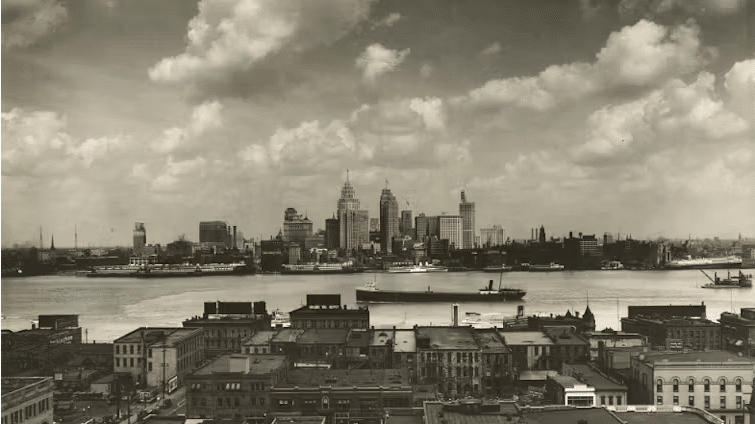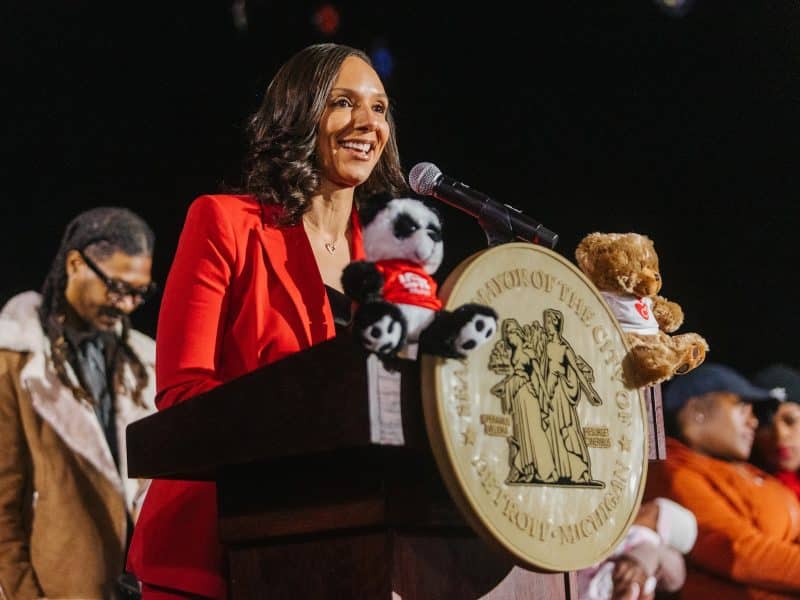More than words: How a DIY literary culture enriches the North End
The North End is home to a vibrant collection of writers, poets, storytellers, and literary advocates imbuing the neighborhood with their artistry.
Halima Cassells is a community activist and gardener. But like many in the North End, she’s got an artistic side, and imbues creativity into all of her activities.
“Who defines who is a creative community?” says Cassells. “There are a lot of people who don’t necessarily see themselves as artists. I would say historically and presently, there’s so much creative genius and talent and need for expression. My mailman is also a singer, my plumber is also in a band.”
Cassells has leadership roles in both the event space ONE Mile Detroit and the Oakland Avenue Artists Coalition. She also recently self-published a children’s book, “Where Did I Come From?,” co-authored by her three young daughters and their dad, Bryce Detroit.
People in the North End can unearth the artistry in anything, and many forms of expression seem to spill into another. But in pockets of the North End you can find distinct literary communities—places where books like Cassells’s are found and shared.
The humble griot
Take Gabrielle Knox for example. Co-founder of the Detroit Poetry Society, the poetry collective hosts frequent writing workshops in a house headquartered in the North End, and books members for performances throughout the city. But she doesn’t consider herself a poet—she prefers to identify as a storyteller.
“If there wasn’t somebody who was like, ‘Okay, we ate these berries and these ones right here with the dot on them made us sick,’ if there wasn’t someone who held that story and that information for people for generations to come, then we wouldn’t be alive,” Knox says. “Storytelling is important.”
When Knox returned to the North End just a few years ago, she attended a series of underground open mic events organized by G-Smoove of North End Productions. There she met other neighborhood poets and learned about other artistic gatherings not well known to the general public.
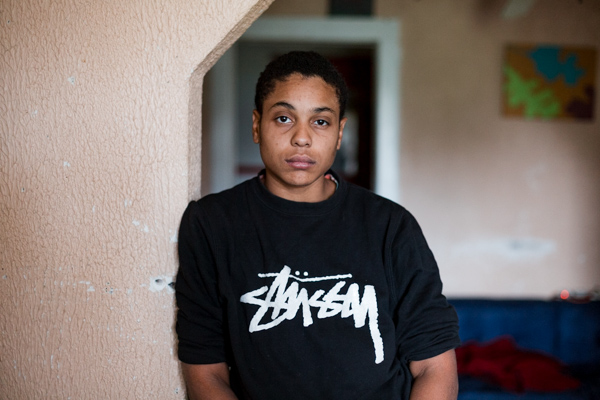
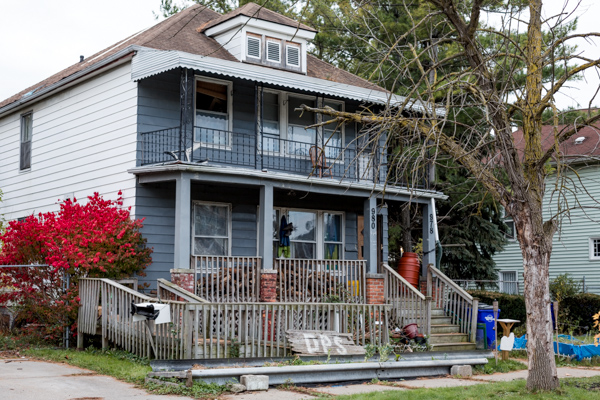
Knox and Detroit Poetry Society co-founder, Sheezy Bo Beezy, recognized a void and envisioned a space where local artists could learn about, promote, and share opportunities to perform stories, and thus the Detroit Poetry Society was born. The collective is made up of a few core members and has grown to include others looking to hone in on their craft and work within a strategic network of creative supporters.
On any given day, the Detroit Poetry Society house welcomes a host of creatives who use the house to chill, meet up, and make something new. For now, the first floor is the most frequented thanks to its heat, water, and electricity, but the group is working to make these essential improvements to every floor. The collective has gained the support of their neighbors, and now the entire block has dedicated Mondays to helping each other make small yet impactful improvements to their homes.
“The North End feels like a little village. It feels like your block did when you were a little kid,” Knox says. “You knew the story of every house, every story in that house brought you some kind of memory, and everybody was watching after you.”
The next generation
In addition to a budding literary community, the North End boasts literacy advocates who are dedicated to creating a brighter future of their own making.
Jamii Tata, whose name translates to “community complex” in Swahili, has spent most of his life in the North End pursuing his many creative endeavors. He also believes in empowering others through literacy, not just for creative ends, but as a survival technique. For Tata, it’s just as important to be able to read and comprehend as it is to understand how to thrive and provide for yourself.
“Resilience is creative to me,” says Tata.
Tata describes his wide-ranging work as a “mechanism to supplement education with a well-rounded approach that is inclusive of culture.” Tata is the founder of both Know Allegiance Nation (KAN) and Illuminate, as well as the president and founder of the Oakland Avenue Arts Coalition. These programs nurture local creatives as they mature, teaching them basic media literacy, entrepreneurship, and growing the local creative community.
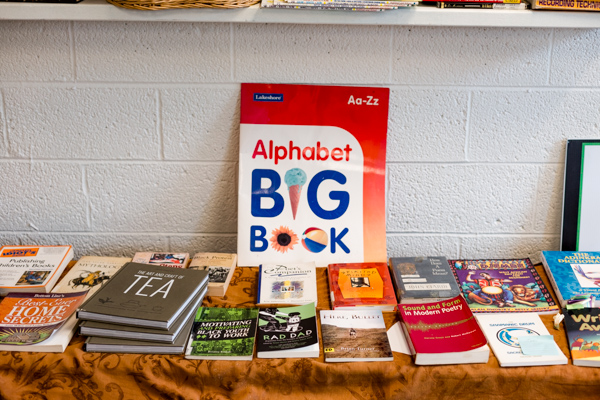
“We call ourselves a village-building enterprise,” says Tata. “Building villages that are knowledgeable about their art, history, and culture. And we provide tools to do that … A book is a legacy tool.”
The premiere event that unites each of these groups is the Healing, a day-long festival of arts and culture, where many students debut and perform their new work and get compensated for it for the first time.
Right now, Tata is focused on fulfilling his lifelong dream of opening a community-owned and run bookstore and has launched a GoFundMe campaign. He owns a storefront that is adjacent to the once-bustling Oakland Avenue business district and intends to highlight local authors and media makers who publish diverse work, such as Halima Cassells. Tata is accepting book donations to fill the bookstore that he hopes will support the students he has mentored and guided throughout the years through book signings, release parties, group classes, and community gatherings.
A little push
If one follows Tata’s archivist philosophy, then Kim Kozlowksi, a Detroit Free Press higher education reporter and literacy advocate, is filling the North End with tool boxes in the form of miniature libraries. Called Little Free Libraries, these mailbox-sized book storage containers are erected in public spaces and encourage pedestrians to “take a book, return a book.”
After learning about the little library movement, Kozlowksi reached out to the Little Free Library network to get a few for herself. As requests from individuals and organizations started rolling in, her simple inquiry grew into a citywide movement. She founded the Detroit Little Libraries campaign.
“You can’t have a future in Detroit if you don’t have a citizenry that reads,” Kozlowski says.
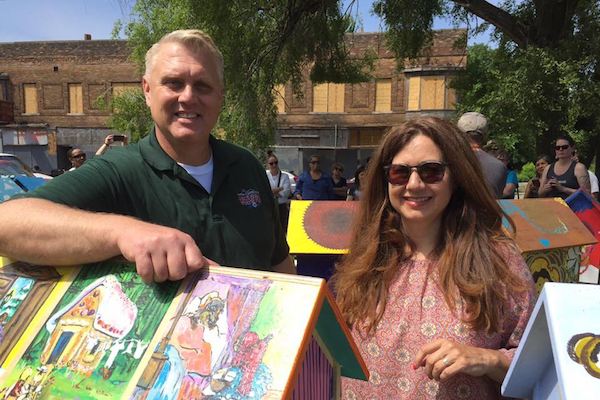
Three years ago, Kozlowski hosted Todd Bol, the Little Library founder, for the first time. Bol donated 20 little free libraries and announced a plan to make Detroit the Little Free Library capital of the country. Thanks to the organization’s national network, Kozlowski’s volunteering, and resident interest, Detroit has become one of the fastest growing Little Library sites after just one year.
Kozlowski found a way to engage the larger arts and culture community by inviting local artists to paint unmarked little libraries and awarding cash prizes based on the public vote. The libraries were then sent to community gardens, which is how the North End’s Oakland Avenue Urban Farm received its little free library painted by Cleo Anderson. Bol returned to Detroit for the event and joined families, residents, and people who have little libraries, also known as stewards, to see the roundup of creations.
The North End’s Vanguard Community Center and the Detroit Poetry Society have become little free library stewards as well.
“I made a conscious effort to reach out to community groups that could have used them, more than neighborhoods who could afford them,” says Kozlowski.
While this DIY approach is no substitute for the presence and access that a dedicated public library provides—the North End’s Henry M. Utley Branch of the Detroit Public Library on Woodward Avenue and Alger Street closed in the 1970s—the process of knocking on your neighbors’ door to ask for a book contributes to the sense of community that the North End has cultivated for years.
“It’s great that these little boxes are facilitating not only reading, but also random acts of kindness among one another,” says Kozlowski. “I can’t think of a time when we’ve needed that more.”
This article is part of the “On the Ground” series, where a journalist is embedded in a neighborhood for three months to provide regular coverage.
Support for this series is provided by the Kresge Foundation.
All photos, except where mentioned, by Nick Hagen.
